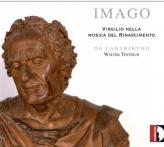Texte paru dans: / Appeared in: |
|
|
Outil de traduction ~ (Très approximatif) |
|
|
Reviewer: J.
F. Weber
I don’t recall ever seeing a
whole disc of Renaissance settings of Virgil’s texts, though such a program
is not unlikely. Paul van Nevel did not even come close with a disc titled
Le chant de Virgile (Fanfare 26:1), for it included texts by Horace,
Catullus, and others. Seven tracks are settings of Dido’s songs in the
Aeneid, including four versions of Dulces exuviae, her dying lament, a word
from which gives the disc its title. Van Nevel recorded six settings of this
text, including four not heard here (five if you discount this instrumental
rendering of Marbriano de Orto’s setting). The Lassus setting, heard on both
discs, was also recorded by Eric van Nevel and Alexander Blachly, while the
Orto setting was also recorded by Capilla Flamenca. The first four tracks include Tityre, tu patulae by Lassus, once recorded by Capella de la Torre (not reviewed here); two settings of O socii by Adrian Willaert and Cipriano de Rore (both recorded by van Nevel), and Fama malum by Josquin des Prez. Josquin’s pair of settings (the other is Dulces exuviae) have been recorded together half a dozen times, most recently by David Skinner. Paul van Nevel’s disc of Cipriano de Rore (26:5) included Dissimulare etiam sperasti, and Blachly also recorded it and Arcadelt’s At trepida et coeptis. Among these pieces found on no more than a few scattered records, there are still a few items that I don’t find elsewhere, including Willaert’s Dulces exuviae, Jaquet of Mantua’s Enceladi Ceique soror, and Lassus’s Alma Venus. These last two, which conclude the program, are settings of anonymous authors inspired by Virgil. A perceptive historical note mentions that the Willaert setting of O socii, durate (“Endure, comrades!”) was commissioned by Cardinal Perrenot de Granvelle, whose motto was “Durate.” There are further settings of Virgil from the period that might have been included. Testolin’s ensemble of nine mixed voices and six players is well balanced and firm of tone. Two tracks feature instrumental renditions, but I hear them with the singers only in two Lassus pieces: The flute is heard in Tityre and the gambas in Dulces exuviae. Testolin has a good track record here with Josquin des Prez, Lassus, Gesualdo, and other composers, each entry contributing worthily to the record shelf. This is one of his more imaginative programs. Are any American high schools still teaching Virgil to seniors? I have it on the word of someone who was there that the local public high school valedictorian, as was customary, delivered his address in Latin in 1914. | |
|
Support us financially by purchasing this disc from eiher one of these suppliers. amazon.fr amazon.usa amazon.uk amazon.ca amazon.de amazon.ja presto classical Un achat via l'un ou l'autre des fournisseurs proposés contribue à défrayer les coûts d'exploitation de ce site. |
|
|
|
|
|
Cliquez l'un ou l'autre
bouton pour découvrir bien d'autres critiques de CD |
|




